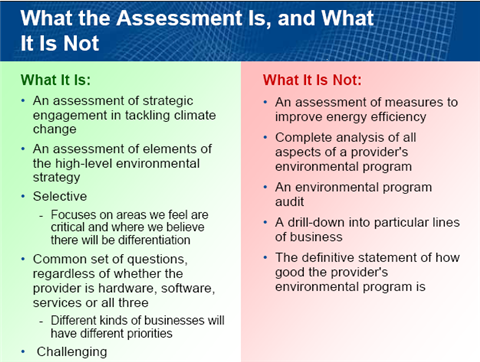How green is your vendor?

Gartner analyst Simon Mingay on Tuesday unveiled ratings for technology vendors to highlight who's talking green and who's actually delivering.
Just don't expect anything too quantitative just yet.
Mingay's presentation at the Gartner Symposium ITXpo caught my attention given that every vendor is talking green IT, sustainability and multiple environmental catchphrases. In a nutshell, Gartner and the World Wildlife Fund set out to rank technology vendors based on their green policies and cut through "greenwash," all the marketing mumbo jumbo you hear daily.
A few key highlights from Mingay's chat:
- Green IT is an oxymoron until you use IT to make the business green. In the end, we're all likely to be greener, not totally green. And biggest takeaway: IT will never be green just less bad.
- The environment matters, but so does price. Mingay had a chart showing the breakdown of IT buying decisions and where being green fits in. Overall, 11 percent of enterprises say environmental concerns are most important when buying technology gear; 54 percent say price and being green are equally important and 35 percent said price is king. In North America 40 percent said that price is king with 9 percent saying being green was most important. For comparison, France breaks down like this: 15 percent said being green is most important and 27 percent went with price. The remainder (58 percent) put green and price as equals. Major footnote: Gartner's survey covered 501 enterprises in France and North America with final responses in January. I'd reckon the economic outlook may skew things to the price side of the equation.
- There's a lot of greenwash going on. Companies that use selective disclosure of positive green policies, focus on the superficial and don't back up their environmental plans with hard goals.
- With those concepts in mind, Gartner surveyed technology companies with 82 questions in five categories. Information was voluntarily disclosed.
This slide provided all the caveats:
In general, a response was considered a good thing since it shows that vendors were at able to detail their plans a bit. Accenture, BT, China Mobile, Cisco, Dell, Deutsche Telecom, HP, IBM, Lenovo, Sun, TCS and Verizon were contacted in phase one. However, Accenture, Acer, AT&T, Deutsche Telecom, EDS, Microsoft, Oracle, Sun and TCS chose not to participate. Mangay said companies on deck include Acer, AT&T, EDS, Ericsson, Fujitsu, Google, Microsoft, Nokia, Nortel, Oracle, SAP and Wipro.
As for the nonresponses, companies may either disagree with Gartner's questions, view a response as a disclosure issue, thought they would score poorly or just didn't care.
Judging from the slides no vendor was perfect--although a few landed in the green sweet spots. Here's a look at Dell vs. Lenovo:
As you can tell, if you land in the green zone that's generally good, but the slides are hard to make out. And most companies got the carbon basics, indicating they at least know that getting to the carbon neutral area is key. Gartner is trying to show vendors and how they reduce the environmental impact across multiple parts of their business to save money. But what's lacking is a Consumer Reports type grid to lay it all out there.
These ratings are a work in progress, but Gartner says it'll have another report in July and the third phase ready to go a year from now.
